
With the growing concern for the safety of personal care products, many people with sensitive skin and pregnant women are especially cautious when choosing deodorants. As a common body odor management product, the ingredients and safety of deodorants have become a widely discussed topic. This article objectively analyzes the safety of deodorants for sensitive skin and pregnant women from a health and medical perspective, helping consumers make more informed choices.
1. Main Ingredients of Deodorants and Their Functions
Deodorants control body odor by reducing sweat production, inhibiting bacterial growth, or neutralizing odors. Common deodorant ingredients include:
- Aluminum salts (such as aluminum chloride and aluminum zirconium compounds): Used to inhibit sweat gland activity and reduce sweat secretion.
- Alcohol: Has antibacterial properties and reduces the number of bacteria on the skin surface.
- Baking soda (sodium bicarbonate): Used to neutralize odors.
- Plant extracts (such as tea tree oil and lavender oil): Natural antibacterial and aromatic ingredients.
- Preservatives and fragrances: Used to extend product shelf life and enhance scent.
2. Effects on Sensitive Skin
Due to a weaker skin barrier function, people with sensitive skin are more prone to irritation. Certain ingredients in deodorants may cause skin reactions, such as:
- Alcohol: May cause dryness, stinging, or redness.
- Fragrances: Common allergens that may trigger allergic reactions.
- Aluminum salts: Some studies suggest that long-term use of aluminum-containing products may irritate the skin.
People with sensitive skin are advised to choose alcohol-free, fragrance-free, and mild-ingredient deodorants. Natural ingredients such as coconut oil, aloe vera, and essential oils are usually more skin-friendly.
3. Safety for Pregnant Women
Pregnant women should pay special attention to the potential impact of product ingredients on fetal health when using deodorants. Current research has not found that common deodorant ingredients directly affect fetal health, but the following points should be noted:
- Aluminum salt safety: Although some studies raise concerns about the long-term use of aluminum salts, there is no conclusive evidence that they harm pregnant women or fetuses.
- Chemical fragrances and preservatives: Certain artificial fragrances and preservatives may be absorbed through the skin and enter the bloodstream in small amounts. Although the dose is very low, pregnant women are advised to choose natural, low-irritation products.
- Natural alternatives: Plant-based deodorants, aluminum-free, and artificial fragrance-free products are safer choices during pregnancy.
4. Safe Usage Recommendations
Whether for sensitive skin or pregnant women, the following principles should be followed when choosing and using deodorants:
- Check ingredient labels: Avoid products containing alcohol, artificial fragrances, and irritating preservatives.
- Conduct a skin test: Apply a small amount of product to the inside of the wrist and observe for 24 hours for any adverse reactions before using.
- Use in moderation: Avoid excessive application to prevent clogged pores or irritation.
- Consult during pregnancy: If any skin abnormalities or allergic reactions occur, discontinue use and consult a doctor.
Deodorants play an essential role in body odor management, but those with sensitive skin and pregnant women need to choose them with extra caution. By understanding product ingredients, selecting gentle formulations, and following safe usage principles, you can maintain freshness while minimizing potential risks to the skin and body. Products like AtomFresh deodorant cream, made with natural and mild ingredients, are ideal choices for sensitive skin and pregnant women.



